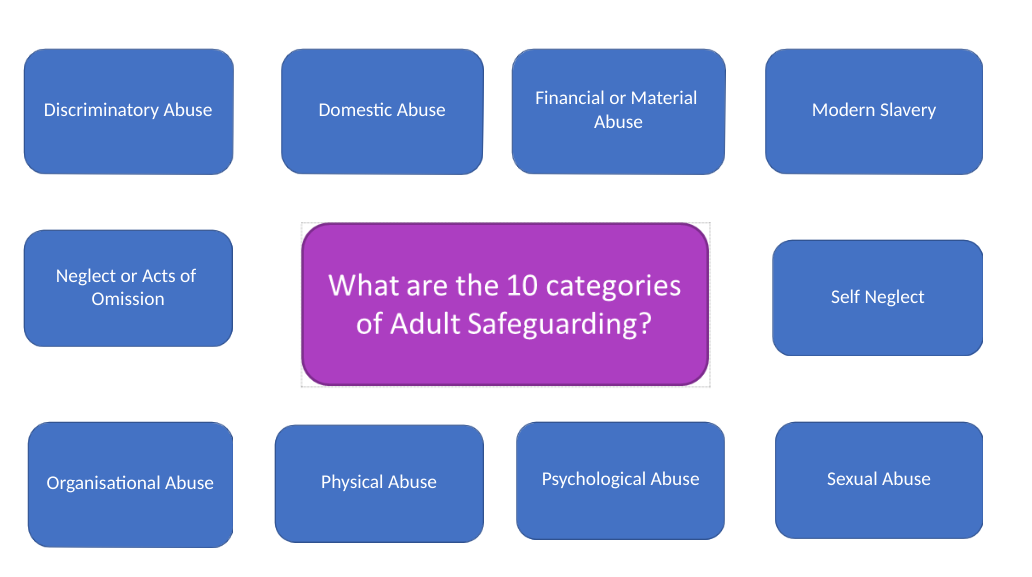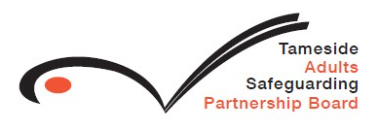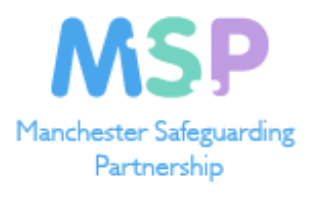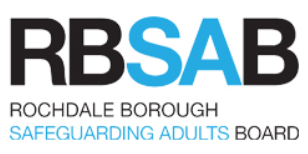Adult Safeguarding
There are 10 categories of Adult Safeguarding.

If you, or someone you know, is being hurt, not looked after or taken advantage of, don’t turn your back on abuse, tell someone.
Abuse is when someone does or says something that:
- Hurts you
- Upsets you
- Makes you feel frightened
You might feel too scared to stop them or tell someone what’s happening.
You might be abused on purpose or the person doing it might not realise it’s wrong or that they are hurting you. But they are both wrong and it should not happen to you.
Adult Safeguarding Booklet
Discriminatory Abuse
Discriminatory abuse is when you are bullied or treats you unfairly because you are different to them.
- Your age,
- Your disability,
- Your race or religion,
- Your sexuality – for example if you are gay or lesbian.
- Your gender – if you are male or female
Domestic Abuse
Domestic abuse is when your partner (or a family member) hurts you or makes you scared in your own home.
Financial or Material Abuse
When someone takes your money or the things you own without asking your permission. It can also be when you are persuaded to give money to someone when you don’t want to.
Is My Home Being Invaded?(Easy to Read)
Modern Slavery
Modern slavery is where you are forced to work for no money.
Self Neglect
When you do not take care of your personal hygiene, cleaning and tidying your home, hoarding or getting help with your health or social care needs.
Sexual Abuse
When someone touches you where you do not want to be touched (on your private parts) or you are made to touch other people on their private parts.
Undressing or having sex when you don’t want to or being made to watch other people doing sexual acts when you don’t want to.
Psychological Abuse
Psychological abuse is when people talk to you or treat you in unkind ways. For example, shouting, swearing, or teasing you. It can also include ignoring you.
When someone upsets you by calling you names, laughing at you, telling you off or not letting you have things that you need. That person might be a carer or people you think are your friends.
Physical Abuse
Physical Abuse is when someone physically hurts you.
It might be:
- Shaking Pushing Hitting Kicking
- Force feeding
- Throwing things at someone
- Giving someone too much medicine
Organisational Abuse
This is when paid staff in a hospital, care home or from a home care agency do not care for you properly or respect your rights.
This could be because:
- There are not enough staff on duty most of the time
- Most of the staff are not trained
- The rules and routines are made by the manager and staff
- Your personal things are used by or for someone else
- Home visits are missed a lot of the time
- Home visits are rushed or not as long as they should be because staff are too busy.
Neglect or Acts of Omission
When someone doesn’t support or care for you properly. For example they don’t give you your medication when they should or they don’t help you bath, get dressed or give you your meals when they should.
Mental Capacity
The Mental Capacity Act is about making sure that people have the supporttheyneedtomakeasmany decisions aspossible.
Mental Health
Worried about your mental health?
How to get treatment and support.
Safeguarding Where You Live:
If you live in Oldham

Oldham Multi Agency
Safeguarding Hub (MASH)
0161 770 7777
_________________________________
If you live in Tameside

Community Gateway Team
Telephone: 0161 922 4888
8.30am to 5.00pm Monday to Wednesday
8.30am to 4.30pm Thursday
8.30am to 4.00pm Friday
Emergency help out of normal office hours
Out of Hours Service: 0161 342 2222
_________________________________
If you live in Manchester

Manchester Contact Centre
Telephone: 0161 234 5001
(open 24 hours a day, seven days a week)
Email: mcsreply@manchester.gov.uk
Online through: Sign-Video
_________________________________
If you live in Rochdale

Who to contact
Telephone: 0300 303 8886
Out of hours: 0300 303 8875 Out of hours
To report a concern please email:
_________________________________
Crimestoppers

This is an independent charity that works with police forces throughout the UK that people can use to pass on information about a crime anonymously.
- call 0800 555 111 (24 hours a day and 7 days a week)
- anonymous online reporting form
- you don’t have to give them your name or any personal information; calls are not recorded and cannot be traced.




